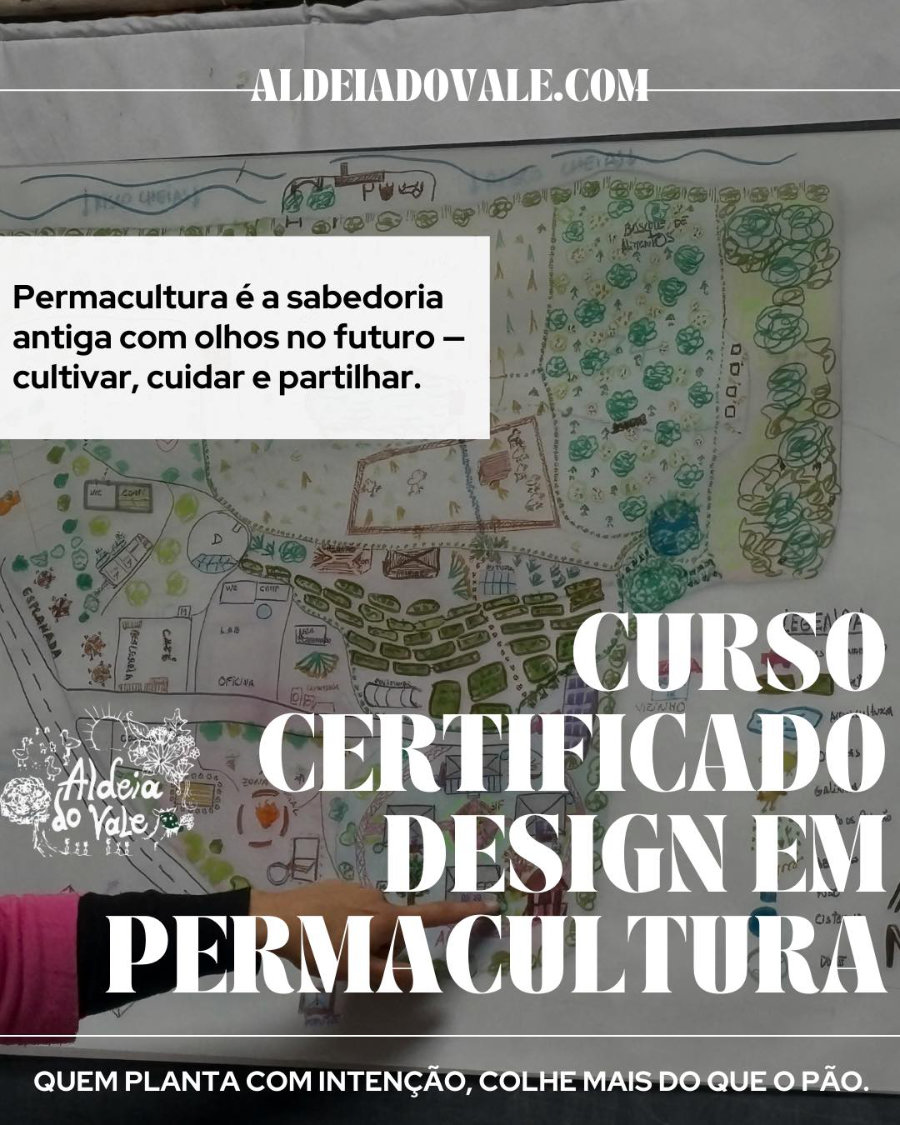
- Event date:17/06/2025 at 8:30 am
- Event end:30/06/2025 at 6:30 pm
- To book, click on the 'Book Now' button. How to book
Join us for an unparalleled learning adventure in the heart of an eco-village in Sintra, guided by permaculture experts Sílvia Floresta and Orlando Pereira.
This intensive two-week course is an opportunity to understand and apply permaculture principles in creating sustainable and regenerative living systems.
Dates: June 17th – 30th, 2025
Schedule: 8:30 AM – 6:30 PM daily | Dinner at 8:00 PM
Location: Aldeia do Vale Agroecological Project, between Sintra and Mafra
Investment: €686.50
Course Highlights
This PDC (Permaculture Design Certificate) course, following the original two-week intensive format created by Bill Mollison, combines theoretical lessons, hands-on workshops, field trips, interactive games, dynamic activities, experience sharing, and community living. The topics covered include:
– Permaculture ethics and principles
– Reading landscapes and understanding natural patterns and cycles and their applications
– Ecosystem principles, climate, and biogeography in permaculture
– Design principles, including analysis processes, zones, and efficient energy planning
-Resource identification, water management, soil mobilization, and mulching techniques
– Soil building and the establishment of permaculture gardens, food forests, orchards, and agroforestry systems
– Seed conservation and collection
– Designing barriers against wind, fire, and agrochemical drift
– Sustainable housing and natural building materials
– Appropriate technologies, including composting toilets, solar dehydrators, and alternative energy solutions
– Introduction to sustainable community and eco-village design
– Ecological sanitation – Wastewater treatment
– Rainwater harvesting
– Water in landscapes – Earthworks, dams, lakes, ponds, and ecological swimming pools.
#####
Datas: 17 a 30 de Junho de 2025
Horário: das 8h30 às 18h30, diariamente | Jantar às 20h
Local: Projeto Agroecológico Aldeia do Vale, situado entre Sintra e Mafra
Investimento: 686,50€
Destaques do Curso
Este curso PDC, seguindo o formato intensivo original de duas semanas criado por Bill Mollison, combina lições teóricas, oficinas práticas, saídas de campo, jogos interativos, atividades dinâmicas, partilha de experiências, e vivência comunitária.
Os tópicos abordados incluem:
- Princípios e éticas da permacultura
- Leitura de paisagens e compreensão dos padrões e ciclos naturais e a sua aplicação
- Princípios dos ecossistemas, clima e biogeografia na permacultura
- Princípios de design, incluindo processo de análise, zonas e planeamento energético eficiente
- Identificação de recursos, gestão de água, mobilização de solos, coberturas de solo
- Construção de solo saudável e estabelecimento de hortas e florestas, bosques, pomares, agroflorestas em permacultura
- Conservação e recolha de sementes
- Design de barreiras contra ventos/fogos / agrotóxicos
- Habitações saudáveis e materiais de construção naturais
- Tecnologias apropriadas, incluindo casas de banho de compostagem, desidratadores solares e energias alternativas
- Introdução ao design de comunidades sustentáveis e eco-aldeias
- Saneamento ecológico – Tramento de águas residuais
- Recolha de àgua da chuva
- Água na paisagem / Terraplanagens / Barragens, lagos, charcas, piscinas ecológicas
